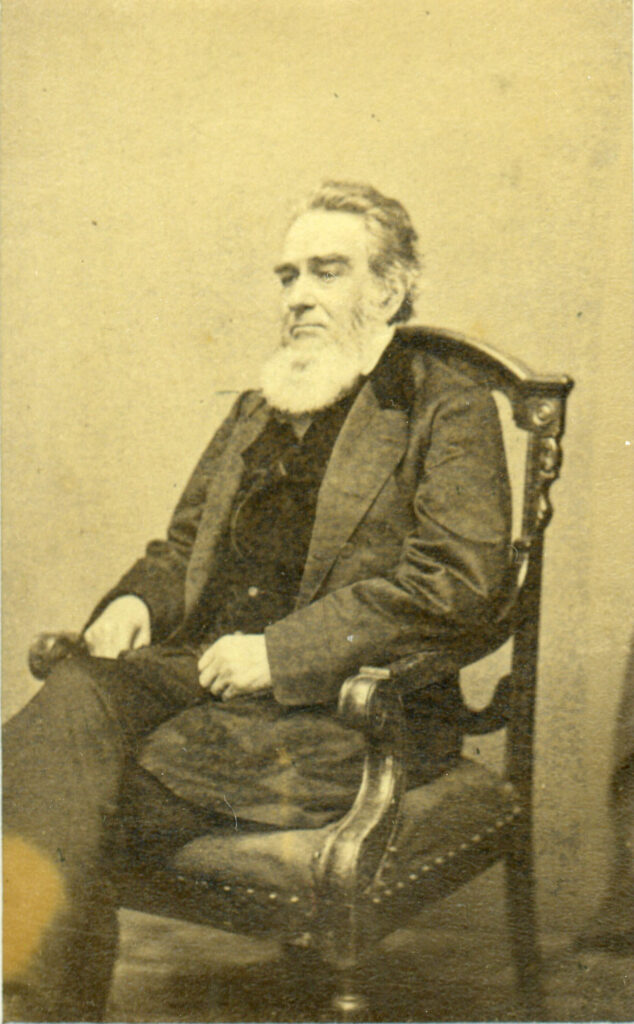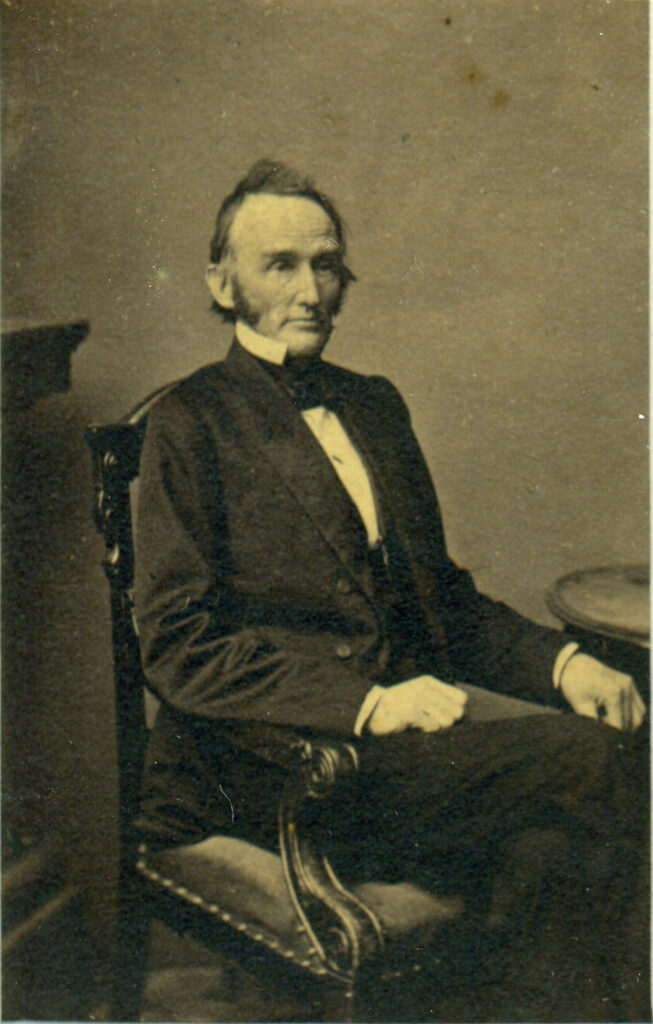Section #22 - The Southern States secede and the attack on Ft. Sumter signals the start of the Civil War
Chapter 282: Lincoln Names His Cabinet And It Debates Sumter Strategy
March 5, 1861
Lincoln Announces His Cabinet

It is not until the day after his swearing-in that Lincoln finalizes his cabinet.
The task has been difficult, given his wish to engage men known for holding very different opinions on matters of state, and expressing them with vigor. The result of these characteristics is a history of personal animosity between several of his choices. Henry Seward and Salmon Chase are sworn enemies – Chase finding Seward too soft on ending slavery and Seward regarding Chase as a radical abolitionist who will provoke the South into a civil war. Both men tell Lincoln that he must make a choice, one or the other.
None of the candidates seem to respect Simon Cameron, who is convinced he is owed a top job because of the president’s victory in Pennsylvania.
Seward, Chase, Cameron and a fourth choice, Edward Bates, have also competed against Lincoln at the 1860 Republican nominating convention. But instead of animosity, he holds them all in high stead, as evident in comments to Thurlow Weed:
Their long experience in public affairs and their eminent fitness (give them) higher claims than his own for the place he was to occupy.
Like Cameron, Edward Bates is formerly a member of the controversial Know-Nothing (American) Party. He hails from the critical border state of Missouri, was once a slave-holder, and becomes the first man west of the Mississippi to hold a cabinet post.
Montgomery Blair is another border state representative and the son of Francis P. Blair, Sr., member of Jackson’s “kitchen cabinet,” and solid Democrat before his role in founding the Republican Party. Of all the cabinet members, the younger Blair will be the only one with military credentials, having graduated from West Point and serving in the Second Seminole War.
Gideon Welles of Connecticut is a former Free Soiler, and chosen to capture the opinions in the New England region. Caleb Smith is from the swing state of Indiana, and, like Seward and Lincoln, is an old-time Whigs.
From the beginning, Lincoln wants Seward for the State Department, but he initially refuses to serve with Chase. When Lincoln hints that he may default to the esteemed New Jersey native, William Dayton, Seward comes on board. Cameron demands the Treasury job; Lincoln gives it to Chase; Cameron settles for the War Department. Chase is perpetually certain that he deserves more than offered, and is the last hold-out before his acceptance.
In the end, Lincoln has assembled the diverse and outspoken cabinet he desires.
Along the way, he has also exhibited the political savvy and firm backbone that will prove so essential to his presidency.
Abraham Lincoln’s Opening Cabinet
| Position | (Total*) | Name | Home State | Prior Party | Age |
| Vice-President | (1) | Hannibal Hamlin | Maine | Democrat | 51 |
| Secretary of State | (1) | Henry Seward | New York | Whig | 59 |
| Secretary of Treasury | (2) | Salmon P. Chase | Ohio | Free Soil | 53 |
| Secretary of War | (2) | Simon Cameron | Pennsylvania | Know Nothing | 61 |
| Attorney General | (2) | Edward Bates | Missouri | Know Nothing | 67 |
| Secretary of Navy | (1) | Gideon Welles | Maine | Free Soil | 58 |
| Postmaster General | (2) | Montgomery Blair | Maryland | Democrat | 47 |
| Secretary of Interior | (2) | Caleb Smith | Indiana | Whig | 52 |
March 7-9, 1861
Lincoln’s Military Men Rule Out Reinforcing Ft. Sumter
After fending off a steady stream of “patronage seekers,” the new president plows into discovering the latest news and thinking about Ft. Sumter.
On March 7 he discusses the situation with Lt. General Scott, in command of the Army, Secretary of the Navy, Gideon Welles, and Rear Admiral Silas Stringham, who begins his service at age eleven in 1809.
All three tell him that the enemy firepower already concentrated in Charleston harbor makes it impossible to reinforce Major Anderson.
Two days later Lincoln returns to the matter, asking for Scott’s beliefs on three questions:
- How long can Anderson hold out? Scott says a month for sure and maybe more.
- If a decision was made to try to reinforce the fort, are the resources available? The answer is “no.”
- If not, what would be required and how long would that take?
This third question has been discussed during Buchanan’s time, and Anderson himself has been asked then for his opinion. While no one knows for sure, what Lincoln hears seems to be the latest consensus, and it is sobering.
Scott explains the formidable forces arrayed against Sumter and says that a fleet of warships will be needed, along with 5,000 regular army troops and another 20,000 volunteers – and that it will take about six months to prepare for such an assault!
March 14, 1861
Lincoln Queries His Cabinet
Lincoln is not happy with Scott’s assessment and decides to put a question on the table to discuss with his full cabinet on March 14, 1861.

Assuming it to be possible to now provision Ft. Sumter under all the circumstances, is it wise to attempt it?
Secretary of State Henry Seward leaps to asserting his opposition to any such action.
The people of the other slave states, divided and balancing between sympathy with the seceding states and loyalty to the Union, have been intensely excited, but at the present moment indicate a disposition to adhere to the Union if nothing extraordinary shall occur…to produce popular exasperation… I would not initiate a war to regain a useless and unnecessary position… I would not provoke war in any way now.
This is what Seward has been saying all along to Lincoln and to anyone else he encounters. It is the rosy-colored glasses version of the situation. The South will soon return to its senses and come back to the Union if only the administration shows patience, avoids all forms of forceful coercion, and gives them time to reconsider the costs of their actions.
Other members of the cabinet want to believe Seward’s outlook, and end up agreeing with what he says in this meeting.
The only exception being the West Point graduate, Montgomery Blair, who mirrors the opinion Lincoln has heard three days earlier from his father, who storms into his office, recounts Andrew Jackson’s threats against the “nullifiers,” and says that abandoning Sumter would be an act of treason.
Blair argues that the duty of the government lies in defending federal property, and that any show of weakness on Ft. Sumter will only embolden the South to try to occupy more outposts, especially Ft. Pickens in Florida.